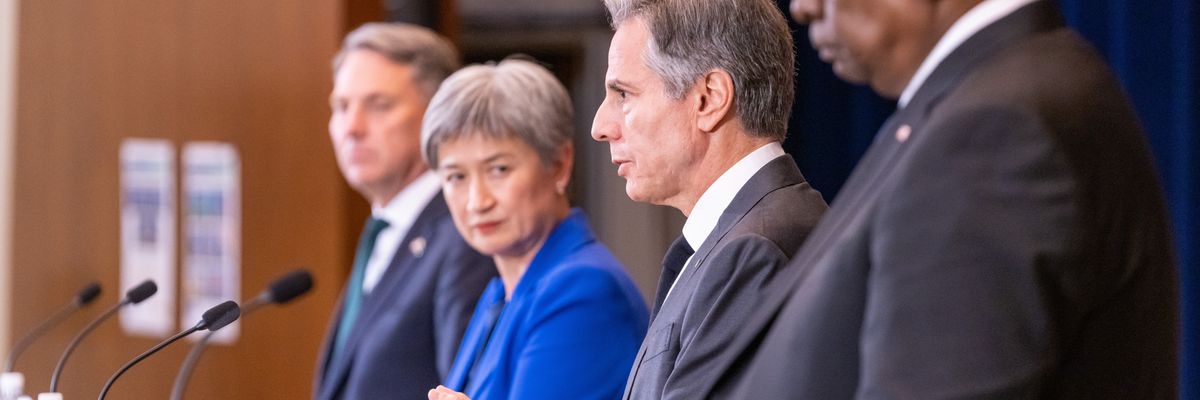The latest annual “Aukmin” summit — the bilateral meeting between Australia and Britain’s foreign and defense ministers held in England earlier this month — was expected to be routine and focus on bilateral ties and the 2021 AUKUS agreement.
However, statements made by Australian foreign minister Penny Wong on the sidelines of this year’s summit added a whole new dimension that sparked controversy and generated noticeable friction with her British hosts.
“My father is descended from Hakka and Cantonese Chinese,” said Wong, who was born in Malaysia. “Many from these clans labored for the British North Borneo company in tin mines and plantations for tobacco and timber. Many worked as domestic servants for British colonists, as did my own grandmother,” she added.
Following these remarks, Canberra’s top diplomat underscored the necessity for Britain to owe up to its colonial and exploitative past if, as London has recently insisted, it wanted to assume a greater role in the larger Asia-Pacific region. “Sheltered in narrower versions” of history, she said, would keep Britain suspect in the eyes of regional players.
Wong’s remarks received an angry reception in London. The Conservative- affiliated Daily Telegraph referred to her as a “’Woke’ Australian Diplomat.” Britain’s foreign minister James Cleverly even took a veiled swipe at his Australian counterpart, referring to his African roots and the Asian roots of Britain’s prime minister, Rishi Sunak, as proof that Britain was indeed confronting its past.
But while Wong’s statements may not have gone down well in Britain, they nevertheless align with the sentiments of powerhouses in the Asia-Pacific, including Indonesia and Malaysia. Owing in part to their own struggles against European colonialism perhaps, these countries, as well as some of their neighbors, have given voice to their concerns about the AUKUS security accord between the United States, Britain, and Australia.
Australia’s Labor government, led by Prime Minister Anthony Albanese, has prioritized the cultivation of warmer ties with these nations. Albanese’s first official overseas visit after last year’s elections was to Indonesia where he was accompanied by a high-level delegation that included the country’s top business leaders. His two-day visit also included a stop in the city of Makassar in the East of the country. The visit was the first of its kind by an Australian prime minister and was given a special touch as Albanese arrived in the city dressed in traditional Indonesian garment. Albanese also expressed his willingness to attend the G-20 summit in Bali despite Russia being one of the attendees, distancing himself from the stance adopted by his predecessor.
Wong meanwhile made a stop in her childhood town during a visit to Malaysia, casting her country’s cultural links and affiliation with the broader region.
Viewed against this backdrop, the Australian foreign minister’s remarks can be seen as part of a broader strategy aimed at shoring up ties with neighboring states by setting Australia apart from the Anglosphere. Indeed, Wong stated as much in her speech, declaring that “Australia as being in the Indo-Pacific and of the Indo-Pacific.”
Such reassurances are all the more important in that they may serve to allay the regional fears related to AUKUS, whose purpose is mainly seen as a de facto military alliance designed to contain China. In what could be interpreted as a success in this regard, Indonesia has recently declared its readiness to deepen defense cooperation with Australia.
Australia under the Albanese government thus emerges as a valuable ally for the Biden administration in its efforts to compete with China. Much more than its conservative predecessor, the current government in Canberra appears to have both a strong grasp and more importantly greater appreciation for the region’s sensitivities, an element that has for the most part been lacking in the broader Western approach to the Asia-Pacific region.
For its part, Washington appears to be focusing on its hard-power strategy by significantly enhancing its military presence in the region and not much more.
In a recent visit to the Philippines. U.S. Defense Secretary Lloyd Austin inked a deal to establish four new American bases in the sprawling archipelago-nation. As Gina Apostol recently argued in the New York Times, such agreements evoke memories not only of the America’s often cruel colonial rule of the Philippines, but also of its support for the dictatorship of the late president, Ferdinand Marcos, during the Cold War.
This approach also serves to alienate other countries, such as Indonesia which is pivotal to the success of any strategy aimed at containing China in the region. Jakarta itself had similar bitter experiences with Washington’s anti-communist policies. President Joko Widodo recently acknowledged the mass killings that took place in his country following the military coup in 1965 that brought General Suharto to power. Despite the CIA’s heavy involvement in enabling these massacres, however, Washington has never officially acknowledged its role.
Rather than embark on a renewed regional military build-up, the United States may — at least in part — be better served by giving greater official recognition to the deleterious impacts its Cold War policies caused throughout Southeast Asia. Penny Wong’s advice to the British, as painful to imperial pride as it may be, could usefully be applied to the United States as well.
















